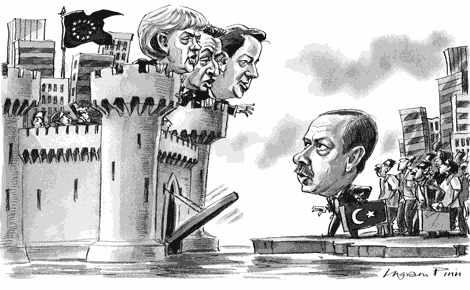By Gideon Rachman

You can gauge the importance of Turkey to the western world by the fact that both Barack Obama and David Cameron gave speeches to the Turkish parliament in Ankara within months of taking office.
The west cares about Turkey because it is a hinge state between east and west and a rare example of a majority Muslim state that is also a secular democracy. Turkey is a neighbour of both Russia and Iran, and is also a member of Nato. It has a rapidly growing and dynamic economy. And yet these days Turkey is also increasingly a source of anxiety to the west.
The country voted against new UN sanctions on Iran and has a dangerously antagonistic relationship with Israel. But it is Turkey’s faltering effort to join the European Union that has come to symbolise the country’s uncertain relationship with the west.
“Talking Turkey” is meant to mean speaking frankly and getting to the heart of the matter. But, in the European Union, “talking Turkey” has become a synonym for double-talk and evasiveness.
Since 2005, the EU and Turkey have been negotiating a treaty that is meant to get Turkey into the EU – a prospect that was first dangled in front of the Turks in 1963. But Angela Merkel, the chancellor of Germany, and President Nicolas Sarkozy of France, have made it clear that they oppose Turkish membership. The Turkish government says it still wants to “join Europe”, yet its foreign policy betrays understandable impatience.
So perhaps it is time really to “talk Turkey” – and to be frank. It would indeed be a wonderful thing if Turkey were to join the EU. But if that is to happen, Turkish membership has to be agreed on a new basis. It cannot involve total free movement of people between Turkey and the rest of the EU.
At present, citizens of all the current 27 members of the EU enjoy visa-free travel around the union – and can move to any other country to work. There are transition arrangements for recent members such as Bulgaria and Romania, which mean that complete free movement of people will not kick in until they have been in the club for seven years. But the rules are clear. Eventually, all citizens of the EU have to enjoy equal rights.
It is those rules that will have to change if Turkish accession to the EU is ever to become a reality. Creating special rules for the Turks would be denounced as unfair, and even racist. But, as long as Turkish membership raises the prospect of mass emigration to the rest of the EU, it will be impossible to sell it to western European voters.
This stark fact has been pretty clear since the enlargement of the EU to central Europe triggered large-scale migration westwards. The British government infamously suggested that about 13,000 Poles would move to Britain to work after Poland joined the union. The real number was well over half a million. The French government is currently controversially deporting gypsies who have moved to France, following Romanian accession to the EU. The surge in the vote for the radical, anti-immigration right in the recent Dutch elections demonstrated that mass migration, particularly from Muslim countries such as Turkey, is unpopular enough to transform domestic politics in some western European countries.
In the face of all this evidence, European politicians would simply be irresponsible to press ahead with negotiations to bring Turkey into the European Union without addressing the issue of immigration. In the long run, they will not do it. In the short run, they take refuge in double-talk and hypocrisy.
On his recent trip to Ankara, Mr Cameron carefully positioned himself as a champion of Turkish membership of the EU, claiming that he was “angry” that Turkey was being so badly treated. The very next day, Mr Cameron re-iterated his determination that the number of immigrants coming into Britain should be sharply reduced. Logically, he cannot have it both ways.
Western European leaders would doubtless argue that now is not the time to deal with these contradictions and hypocrisies. Even on the best-case scenario, Turkish membership is still many years off. The difficult issues can be dealt with later.
But that is far too complacent. The fact is that Turkey is an important country whose relations with the west are deteriorating fast.
It would be a gamble to try to revive the Turkish-EU conversation by finally facing up to the question of immigration. The Turks might walk away in a huff. But even without complete free movement of people, Turkey would still have a great deal to gain from joining the EU.
As the second most populous nation in the union – and perhaps soon the largest – it would have a huge weight in the framing of European law, and a big delegation at the European Parliament. Turkey would also get the financial and structural aid that the EU lavishes on poorer, new members. It would have unfettered access to the European single market, a big say in the framing of EU foreign policy and the legal and diplomatic protections that come with EU membership. Under the new deal Turkish citizens would not get the automatic right to work anywhere in the EU; but they could expect travel to become significantly easier.
Membership of the EU, without complete free movement of people, is a deal Turkey might choose to reject or accept. But, at least it is an offer that could be made in good faith.
, August 23 2010



